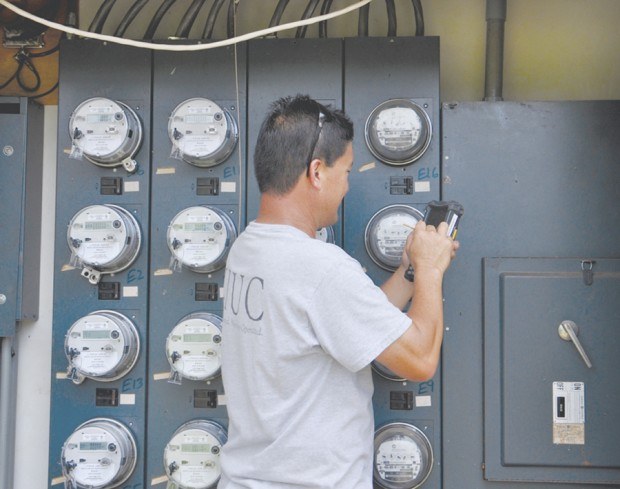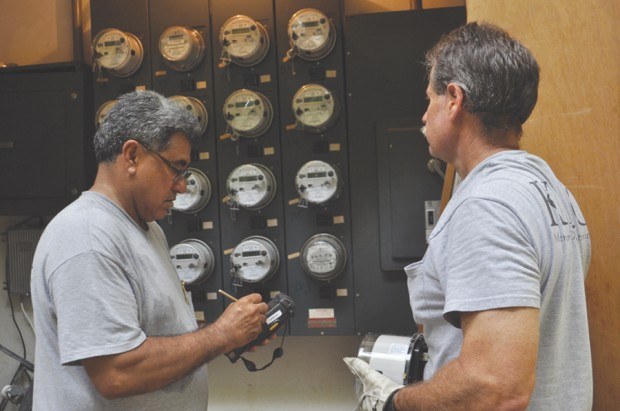LIHU‘E — With more than 17,500 smart meters already installed, the Kaua‘i Island Utility Cooperative is more than halfway finished with the project to replace older mechanical meters at 33,000 homes and businesses. The new meters send a signal straight
LIHU‘E — With more than 17,500 smart meters already installed, the Kaua‘i Island Utility Cooperative is more than halfway finished with the project to replace older mechanical meters at 33,000 homes and businesses.
The new meters send a signal straight to the KIUC offices via a system of routers installed around the island.
“We can literally look in on a system outage and get on it right away,” said Jim Kelley, KIUC communications manager. “It’s good from a service standpoint.”
In addition, the smart meters allow service to report real-time energy usage, and can be turned on and off from the KIUC office, so new customers will no longer have to wait at a residence or business for a service technician to show up and turn on the power — or worse, to cut off power for delinquent customers.
The units also help the utility accommodate more renewable energy in the grid.
“We don’t have to go out and read meters,” said Kelley, which in turn protects KIUC employees from a number of situations, including dealing with dogs or other potentially hazardous conditions. “The meter shows usage in real time.”
In addition, around 450 customers have signed up to receive an in-home display that tells them exactly how much energy is being used in real time. The unit also can be set to show the cost of energy being used at current rates.
The program is costing KIUC $11 million, of which half is being covered by a grant from the U.S. Department of Energy.
KIUC has met with some opposition to the new smart meters. To date, 2,297 residents have asked for deferrals on installations.
“If you don’t want one, you don’t have to have one,” Kelley said.
The utility is looking into charging residents who don’t have the newest meters in order to offset the cost of the fuel and expense of having a technician continuing to provide monthly reports.
However, Michael Yamane, KIUC chief of operations, told the Honolulu Star-Advertiser earlier this year that response to the smart meters from KIUC members generally has been positive.
According to a story in the Las Vegas Sun last week, “The Federal Communications Commission has rated the smart meters as safe, saying they are considered unlikely to cause bodily tissue heating or electric shock. The radio frequency radiation levels are much lower than those emitted by cell phones, supporters say.”
KIUC has been planning to need fewer technicians for awhile and has held open various jobs in which the technicians can transition into and remain with the utility.
The utility is working on ways to reduce operating costs over the long term, Kelley said, including looking to implement more renewable energy streams, such as bringing online a biomass burning facility and increasing hydro power and solar power.
Customers who use photovoltaic systems also pose a challenge for KIUC, Kelley said, because it is not sunny here all the time, so places using solar panels tend to have dips and spikes in their electric. Due to the high cost of batteries, it is almost impossible to store PV generated energy for use at night, when the PV systems are unable to produce, he said.
“We’re trying to find a fair way to distribute costs and keep up the system for everyone,” Kelley said.
Kelley added that wind generation is not a feasible solution to Kaua‘i’s rising energy costs because of shearwaters, which are a federally protected, endangered species of seabirds found only on the Garden Island.
The KIUC is looking at modernizing hydroplants built years ago by plantations as a means of providing effective low-tech clean energy that is able to produce throughout the night.
“It’s promising and appropriate for Kauai,” said Kelley. “We are on a mission to be 50 percent renewable by 2023.”
• Laurie Cicotello, business writer, can be reached at 245-3681 (ext. 257) or business@thegardenisland.com



